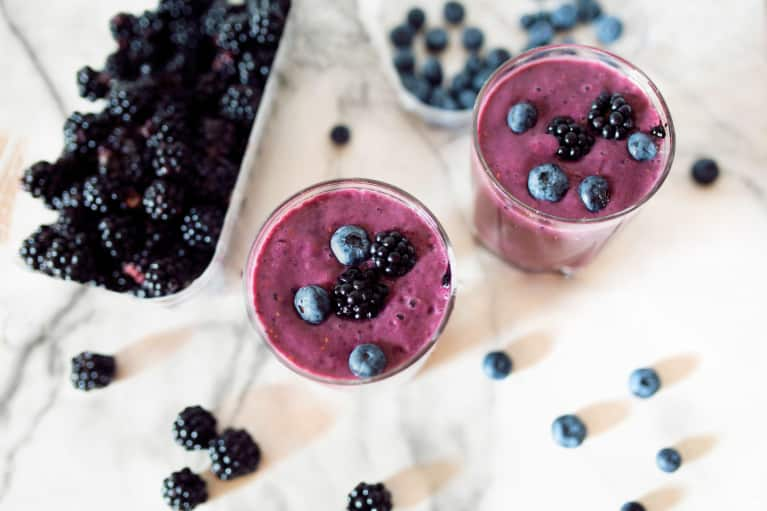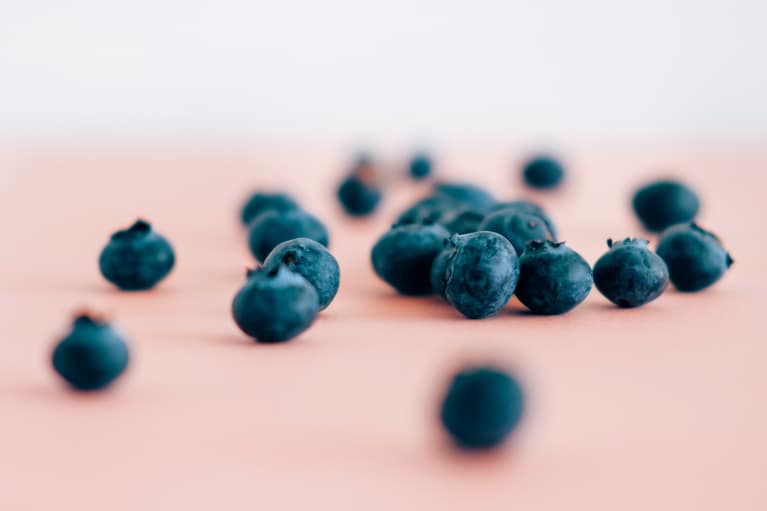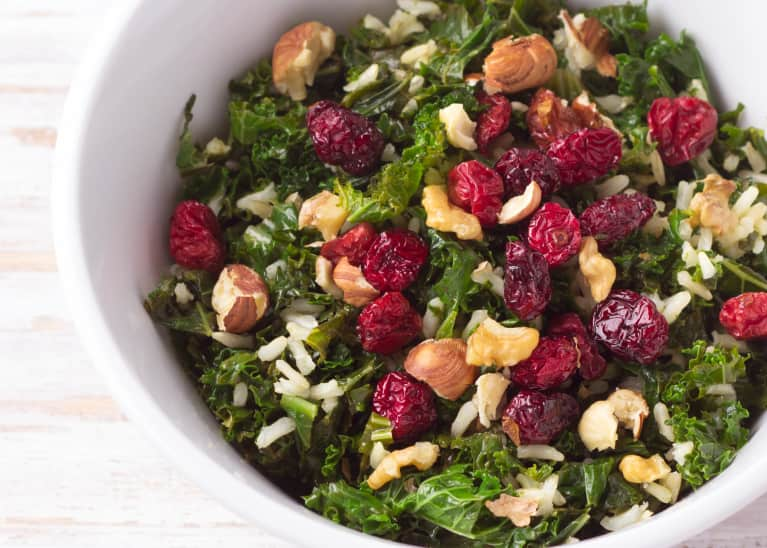Pterostilbene: Why This Potent Antioxidant Might Be Better Than Resveratrol Stephanie Eckelkamp By Stephanie Eckelkamp ( COURTECY;- mbg food )
Pterostilbene: Why This Potent Antioxidant Might Be Better Than Resveratrol
August 28, 2018 — 9:09 AM
Sure, you've heard of resveratrol and turmeric for their potent antioxidant perks, but there's a lesser-known inflammation fighter on the block that also deserves your attention. It's called pterostilbene (terro-STILL-bene), the predominant polyphenol antioxidant found in blueberries.
Pterostilbene is closely related to resveratrol, an antioxidant found in grapes, and seems to have similar benefits—although, there are far fewer studies on pterostilbene. Both are compounds known as stilbenes, but research shows that pterostilbene has superior bioavailability (about 80 percent bioavailability compared to resveratrol's 20 percent). This means that your body may be able to use it more efficiently and effectively. Some experts also believe that pterostilbene and resveratrol are better when consumed together, acting synergistically to promote health and prevent a variety of diseases, which is why you'll often find them packaged together in supplements.
Pterostilbene health benefits.
To date, pterostilbene perks sure sound impressive, with research suggesting this compound plays a role in fighting cancer, reducing inflammation, managing diabetes, reducing the risk of cardiovascular disease, improving neurological function, countering the aging process, and more. It should be said, though, that most studies on pterostilbene are lab and animal studies, and there's a need for more rigorous human clinical trials. But the fact that pterostilbene-rich plants have been used for hundreds, if not thousands, of years in both ayurvedic medicine and traditional Chinese medicine is certainly evidence in this antioxidant's favor.
Here are some of the exciting ways pterostilbene may help boost your health—plus, tips on the best and safest way to reap the benefits:
1. Pterostilbene may help slow the aging process.
Oxidative stress is basically an imbalance between antioxidants and free radicals in your body. It can be caused by a poor diet, pollution, cigarette smoke, and pesticides, and it may promote inflammation and lead to a number of chronic diseases. In general, it wreaks havoc on your body and speeds the overall aging process. The good news is that pterostilbene is a potent free radical fighter that reduces oxidative stress. Some evidence even suggests that pterostilbene and resveratrol may mimic the effects of calorie restriction, a practice that has been shown to increase life span and help prevent age-related disorders.
Pterostilbene has also been shown to increases levels of glutathione, another antioxidant that's been linked to everything from improved detoxification to reduced oxidative stress in mitochondria. Mitochondria are the energy powerhouses of our cells and play a role in most age-related diseases, and they also make sure you have enough energy to function optimally.
2. It may help fight or prevent cancer.
Similar to resveratrol, pterostilbene is anti-carcinogenic. A review of several studies suggests that it may be an effective anti-cancer agent based on its antineoplastic properties—the ability to prevent, inhibit, or halt the development of a tumor. It seems to exert its anti-cancer benefits in a few different ways: by altering the cell cycle, inducing apoptosis (or cell death), and inhibiting metastasis (the spread of cancer from one part of the body to another). Animal studies on human cells suggest that pterostilbene may offer protection against breast cancer, colon cancer, pancreatic cancer, prostate cancer, and potentially other forms of this disease. Just remember to always talk to your doctor before starting any supplement, especially if you have a chronic or serious health condition.
3. Pterostilbene may boost brain health and prevent Alzheimer's.
Pterostilbene seems to offer neuroprotective benefits due to its antioxidant activity, which helps prevent oxidative stress in the brain. In one study on mice, researchers concluded that pterostilbene may help preserve cognitive function and reduce the risk of Alzheimer's disease, in part by reducing inflammation. Regular consumption of blueberries, the most potent natural source of pterostilbene, has also been associated with slower rates of cognitive decline. Berries also contain flavonoid antioxidants called anthocyanins, which likely play an important role in brain and overall health.
4. It may reduce your risk for heart disease.
Pterostilbene may improve overall cardiovascular health. In a clinical trial on 80 patients with high cholesterol, those who took 125 mg of pterostilbene twice a day experienced significant reductions in blood pressure (a 7.8 mmHg drop in systolic BP and a 7.3 mmHg drop in diastolic BP) compared to those in the placebo group. The participants who weren't on cholesterol-lowering medication also experienced minor weight loss. Pterostilbene may also help prevent atherosclerosis (hardening of the arteries) by inhibiting the buildup of LDL cholesterol, according to tests on human cells and on mice.
5. Pterostilbene may help regulate blood sugar and manage diabetes.
Several animal studies have found that supplementing with pterostilbene lowers blood glucose levels, which suggests that this antioxidant may play a role in protecting against diabetes and improving insulin sensitivity. In one study, a dose of 20 mg/kg pterostilbene decreased blood glucose levels by 42 percent and body weight by 20 percent in mice. Some researchers speculate that pterostilbene acts in a similar way to the antidiabetic drug metformin. One proposed mechanism for regulating blood sugar is that pterostilbene reduces oxidative stress in the liver and kidneys.
Natural sources of pterostilbene.
In addition to blueberries, pterostilbene food sources include other deeply hued berries such as cranberries, bilberries, lingonberries, huckleberries, and red grapes. And while these berries contain far less pterostilbene than amounts used in the studies above, research does suggest that a diet high in berries (even just a ½-cup serving per day) may help ward off cognitive decline and promote heart health, due to the wide range of antioxidant compounds they contain, which may work synergistically. Berries are also a great source of fiber, which is important for balanced blood sugar, heart health, and gut health.
Other plant sources of pterostilbene do exist, but they're not necessarily edible. Several plants that contain pterostilbene are used in ayurvedic and traditional Chinese medicine as natural remedies for a variety of health conditions. These include bark from the kino tree(also called heartwood), which is used to promote healthy blood sugar and weight loss; a shrub called "ku ma du" that's used for the treatment of hypertension; and Chinese rhubarb, or "da huang," used to treat digestive disorders.
Should you take a pterostilbene supplement?
Given the exciting benefits described above, reaching for a pterostilbene supplement may seem like a no-brainer. But before you do, understand that studies haven't fully evaluated the safety of taking them long term. However, from the few studies that have been done on humans, these supplements appear to be safe.
In one clinical trial, participants were given up to 250 mg of trans-pterostilbene per day, and the side effects were comparable to a placebo. Plus, the participants taking the pterostilbene experienced a reduction in blood pressure. Pills typically contain 50 mg of trans-pterostilbene, and the recommended daily dose is between 50 mg and 150 mg, so it would be hard to exceed a safe range. That said, the amount of pterostilbene that is currently recommended for humans is still far lower than quantities given to animals in many of the studies mentioned above, making it difficult to determine if supplementing will truly be beneficial for everyone. More studies are certainly needed.
The bottom line on pterostilbene.
The benefits of pterostilbene are promising, and supplements are likely safe for most people. That said, there's still not quite enough human evidence to prove that pterostilbene supplements will adequately treat all of the conditions mentioned in this article. So you should always consult with your health care provider before taking one, especially if you're using it to manage a specific health condition. Food sources of pterostilbene, on the other hand, contain a wide range of beneficial compounds that have been shown to promote overall health, and there's no reason not to include them in your diet along with other nutrient-rich whole foods.
And here's our take on resveratrol.




মন্তব্যসমূহ
একটি মন্তব্য পোস্ট করুন